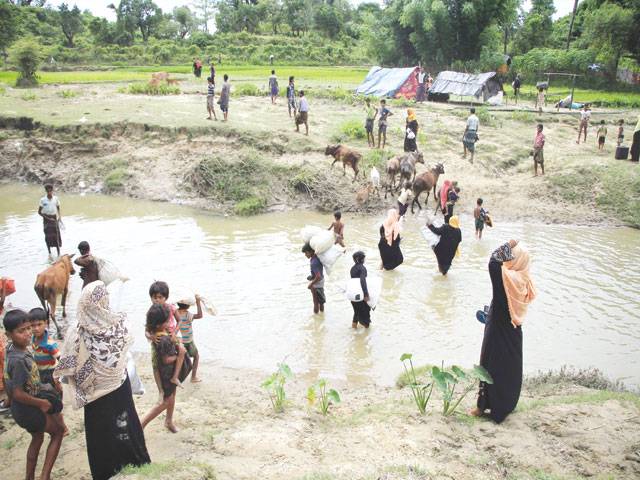COX'S BAZAR - At least 6,000 Rohingya civilians fleeing renewed violence in Myanmar are stranded near the border with Bangladesh which is blocking their entry, a senior Bangladeshi official said Tuesday, as the United Nations urged Dhaka to let them in.
Bangladesh has barred thousands of members of the stateless Muslim minority from entering the country since Friday, when fresh fighting broke out between Myanmar's security forces and Rohingya militants in neighbouring Rakhine state leaving at least 110 people dead. The UN refugee agency has said some 5,200 people have managed to cross into Bangladesh in the past three days.
But the majority have been stopped at the border despite heavy fighting in nearby villages, even coming under fire on Saturday as they huddled along the "zero line" which marks the northernmost part of the border.
"Around 6,000 Myanmar nationals have gathered on the border and are trying to enter Bangladesh," a senior Border Guard Bangladesh official told AFP, referring to the Rohingya.
The official said the situation across the border, which is demarcated in parts by narrow stretches of the Naf River, was "still volatile".
"Last night we heard heavy gunfire by automatic weapons in phases and saw smoke billowing from burnt villages across the border," he said. Another border guard official estimated the number of Rohingya in limbo could exceed 10,000, as many were believed to be hiding in hills and forests to escape nearby violence.
But border guards have been ordered not to let them cross.
"How can I deny shelter to (a) newborn who is dying from cold?" said the border guard, who asked to remain anonymous.
With around 400,000 Rohingya already living in squalid camps in Bangladesh, the government has instructed its border guards to prevent another influx at all costs. Instead nearly 500 Rohingya have been detained and returned trying to cross the border since Monday, according to Shariful Islam Jamaddar, a deputy border guard commander. Border guards have been driving Rohingya who have managed to cross into Bangladesh back across the border several times a day, an AFP correspondent said.
Some Rohingya have made it just inside Bangladeshi territory, momentarily safe from violence but unable to move onwards to shelter.
Mohammad Ismail had taken shelter from the rain under a plastic sheet erected by border guards, but the shelter has since been torn down. "The border guards let us take shelter here but I don't know now what I will do with my son," he told AFP, gesturing to the shivering boy.
Amid the turbulence and monsoon downpours, an 11-year-old Rohingya girl named Marium was separated from her parents. "I went to the toilet when the (border) guards drove away my parents. Where shall I find them now?" the young girl told AFP in tears.
On Monday Bangladeshi authorities proposed joint military operations with Myanmar against Rohingya militants fighting in Rakhine, hoping to stem the flow of displaced. The militants say they are fighting to protect the persecuted roughly one million-strong Rohingya and accuse the state and ethnic Rakhine Buddhists of trying to force them from Myanmar.
The Rohingya are not recognised as an ethnic group, which would be protected by law, but are instead branded 'Bengalis' - code for illegal migrants from Bangladesh.
Their ability to move, work and receive basic services is tightly controlled.
Speaking to ambassadors in Yangon, Myanmar's Home Affairs Minister Kyaw Swe, repeated the official line: "There are no Rohingya."
The recent attacks by militants are because "Bengali people... tried to occupy lands" in Rakhine.
Last week a commission headed by former UN chief Kofi Annan called for Myanmar to find a pathway to citizenship for the Rohingya and ease suffocating controls, or risk inflaming religious hatreds.






